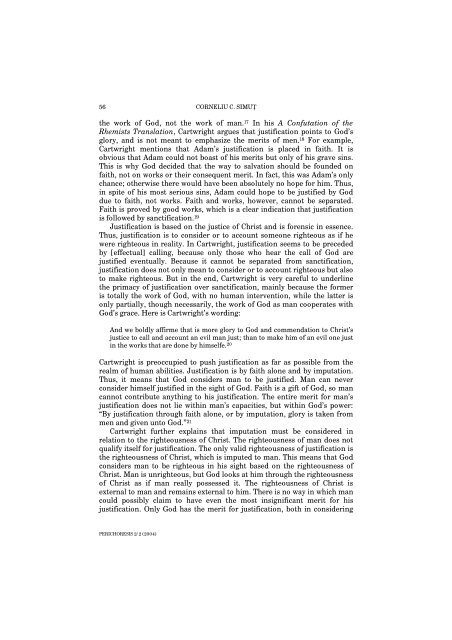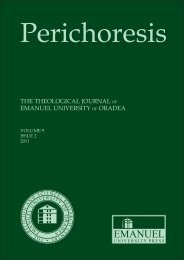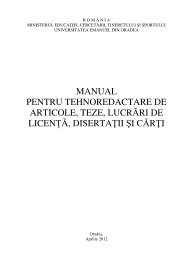Paradise Lost - Universitatea "Emanuel"
Paradise Lost - Universitatea "Emanuel"
Paradise Lost - Universitatea "Emanuel"
You also want an ePaper? Increase the reach of your titles
YUMPU automatically turns print PDFs into web optimized ePapers that Google loves.
56<br />
PERICHORESIS 2/2 (2004)<br />
CORNELIU C. SIMUŢ<br />
the work of God, not the work of man. 17 In his A Confutation of the<br />
Rhemists Translation, Cartwright argues that justification points to God’s<br />
glory, and is not meant to emphasize the merits of men. 18 For example,<br />
Cartwright mentions that Adam’s justification is placed in faith. It is<br />
obvious that Adam could not boast of his merits but only of his grave sins.<br />
This is why God decided that the way to salvation should be founded on<br />
faith, not on works or their consequent merit. In fact, this was Adam’s only<br />
chance; otherwise there would have been absolutely no hope for him. Thus,<br />
in spite of his most serious sins, Adam could hope to be justified by God<br />
due to faith, not works. Faith and works, however, cannot be separated.<br />
Faith is proved by good works, which is a clear indication that justification<br />
is followed by sanctification. 19<br />
Justification is based on the justice of Christ and is forensic in essence.<br />
Thus, justification is to consider or to account someone righteous as if he<br />
were righteous in reality. In Cartwright, justification seems to be preceded<br />
by [effectual] calling, because only those who hear the call of God are<br />
justified eventually. Because it cannot be separated from sanctification,<br />
justification does not only mean to consider or to account righteous but also<br />
to make righteous. But in the end, Cartwright is very careful to underline<br />
the primacy of justification over sanctification, mainly because the former<br />
is totally the work of God, with no human intervention, while the latter is<br />
only partially, though necessarily, the work of God as man cooperates with<br />
God’s grace. Here is Cartwright’s wording:<br />
And we boldly affirme that is more glory to God and commendation to Christ’s<br />
justice to call and account an evil man just; than to make him of an evil one just<br />
in the works that are done by himselfe. 20<br />
Cartwright is preoccupied to push justification as far as possible from the<br />
realm of human abilities. Justification is by faith alone and by imputation.<br />
Thus, it means that God considers man to be justified. Man can never<br />
consider himself justified in the sight of God. Faith is a gift of God, so man<br />
cannot contribute anything to his justification. The entire merit for man’s<br />
justification does not lie within man’s capacities, but within God’s power:<br />
“By justification through faith alone, or by imputation, glory is taken from<br />
men and given unto God.” 21<br />
Cartwright further explains that imputation must be considered in<br />
relation to the righteousness of Christ. The righteousness of man does not<br />
qualify itself for justification. The only valid righteousness of justification is<br />
the righteousness of Christ, which is imputed to man. This means that God<br />
considers man to be righteous in his sight based on the righteousness of<br />
Christ. Man is unrighteous, but God looks at him through the righteousness<br />
of Christ as if man really possessed it. The righteousness of Christ is<br />
external to man and remains external to him. There is no way in which man<br />
could possibly claim to have even the most insignificant merit for his<br />
justification. Only God has the merit for justification, both in considering




